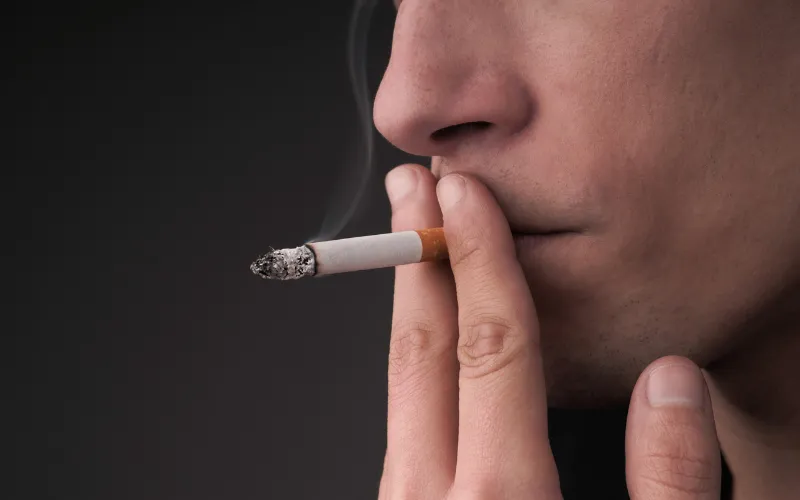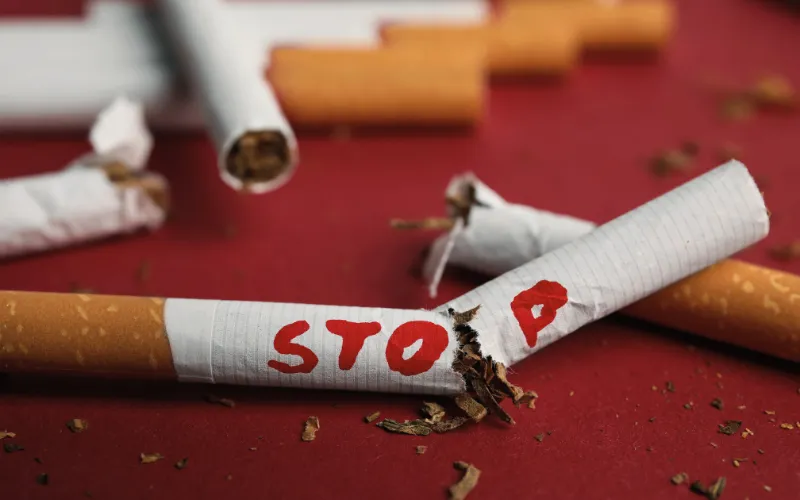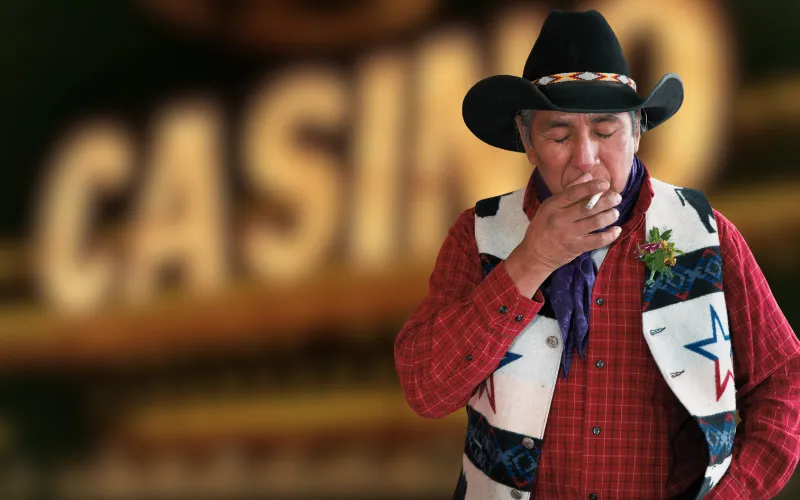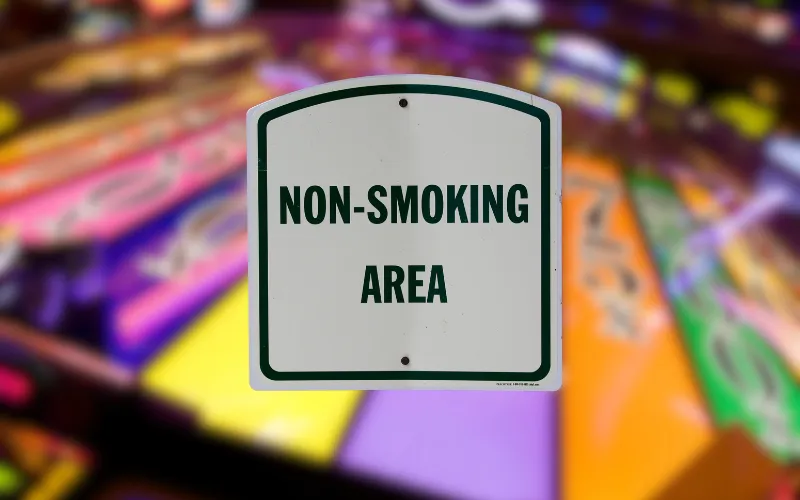Smoking in Casinos: still Legal?
Here are the facts, and my personal take on the smoking debate in Casinos

Smoking in casinos has been a staple for many decades, alongside the sounds of chips clinking and slot machines spinning. However, this tradition is slowly shifting. The legality of smoking in casinos depends on location, state law, and even tribal ownership.
Public health concerns about secondhand smoke across the country are challenging the long-held concept that smoking belongs in casinos.
This article explores the history of smoking in casinos, the health risks of secondhand smoke, and arguments for and against smoking bans. We'll also discuss tribal casinos and international smoking regulations compared to the US.
History of Smoking and Gambling

Cigarettes was first used by Native Americans back in the 18th-19th century while the first ever game of chance was played in 1492 by Columbus' sailors. Since then, smoking while gambling has been widely considered socially acceptable and even glamorous, much like we see in Hollywood movies.
Smoking in casinos has been ingrained in gambling culture with the latter actively promoting it as part of the overall experience.
Additionally, the ventilation systems of the area were not designed to handle significant smoke volume, further solidifying the link between smoking and the casino atmosphere.
Relaxation, Excitement, and Retention
Several factors fueled the link between smoking and casinos. For gamblers, cigarettes offered relaxation amidst the thrill of gambling. The act of smoking calms the nerves and provides a sense of comfort and familiarity in the fast-paced environment.
Casinos, on the other hand, saw smoking as a way to cater to a specific demographic and allowed it to attract and retain high-roller customers. This focus stemmed from the belief that smokers were more addicted gamblers, leading to higher revenue.
Early Efforts to Smoke-free Casinos
It's worth mentioning that worries about smoking in casinos, although uncommon, have been around for a while. Even in the 1970s, there were occasional efforts by non-smoking customers and advocacy groups to restrict smoking in public spaces, including casinos. However, these attempts were mostly unsuccessful because of the strong influence of the tobacco industry and the dominant social acceptance of smoking.
As scientific evidence on the dangers of secondhand smoke rose, public opinion on smoking began to shift dramatically. This led to stricter regulations on smoking in public places, including workplaces and restaurants. Casinos eventually became a target for anti-smoking legislation.
Health Concerns and Public Opinion

Those who are against smoking in casinos argue that it poses health risks and goes against the growing public opinion on the issue. They believe that secondhand smoke is harmful and can negatively affect the health of both employees and patrons.
According to the Centers for Disease Control and Prevention (CDC), secondhand smoke contains over 7,000 chemicals, including 70 cancer-causing. Breathing in secondhand smoke has been linked to numerous health issues, such as respiratory infections, heart disease, and lung cancer.
Moreover, smoking itself has significant health risks for smokers. The CDC states that smoking cigarettes increases the risk of developing various diseases, including lung cancer, heart disease, stroke, and respiratory diseases.
Banning tobacco smoke in casinos aims to create a healthier environment, due to the serious health consequences of secondhand smoke exposure.
When Did Smoking in Casinos Become Illegal?

Smoking in casinos became illegal in most US states after 2006. Until recently, some states had laws that prevented cities and towns from making their own rules about smoking in public places.
All indoor spaces, including casinos, had to comply with state law, which may have permitted smoking. However, seven states; Illinois, Louisiana, Mississippi, Montana, Nevada, New Jersey, and Oregon have eliminated these laws.
This change happened by December 31st, 2023. As a result, cities and towns in those states now have the power to decide their policies on smoking bans, including whether or not to allow smoking in casinos. This means the future of smoking in casinos might vary depending on local regulations within these states.
The Debate Surrounding Indoor Smoking in Casinos

Advocates say casino smoking risks the health of employees and should face indoor bans. Owners, however, see it as a personal choice and attraction for customers.
Native land or carve-out exceptions can exempt some casinos from state bans. Laws on smoking in public spaces differ, and some casinos voluntarily implement bans. The debate gained attention during the recent pandemic which involved public health, personal choices, and business interests.
The Complexities of Indoor Smoking Laws in the U.S
The rules for smoking in casinos are different across the USA. Here is a simpler breakdown of the complexities surrounding the indoor smoking laws:
- Currently, 14 states allow smoking inside casinos.
- Some states, like Nevada, have stricter laws but still let people smoke in casinos.
- Many states are considering banning smoking in casinos altogether.
There are two main arguments for these bans:
Health Concerns
People who support bans say secondhand smoke is bad for everyone's health, including casino workers and customers. They want cleaner air for everyone.
Economic Impact
While some casino owners worry that a smoking ban might scare away smokers and hurt business, the picture isn't entirely clear. Studies have shown mixed results. For example, a study in Delaware found a slight decline in gaming revenue around 13% after a smoking ban (Bradley & Becker, 2011). Managers reported decreased operational costs due to reduced spending on ventilation and cleaning.
A smoking ban in casinos may be a financial balancing act. It may cause a slight decline in revenue, but this could be offset by lower operational costs, potentially leading to long-term revenue growth.
The Rise of Smoke-Free Casinos

The rise of smoke-free casinos is a growing trend due to increased awareness of the health risks of secondhand smoke. People, including employees and owners, support these bans for health benefits and better air quality.
Non-smoking patrons also prefer a cleaner environment, boosting foot traffic and business. Smoke-free casinos have been economically beneficial, despite initial concerns about revenue.
Data from multiple areas indicates that non-smoking casinos often outperform smoking ones, leading to a change in perspective and more casinos considering going smoke-free to attract a broader customer base and enhance their overall business.
Park MGM in Las Vegas is a successful smoke-free casino. It is the first and only one on the strip with safe air quality and positive results, including increased customer satisfaction.
Effects of Smoking Ban on Tribal Casinos

Tribal casinos add another layer of complexity to the smoking ban debate. Because they operate on sovereign tribal land, they're generally exempt from state smoking laws. This means each tribe gets to decide its smoking policy.
Balancing Health and Tradition
Some tribes choose smoke-free environments for health reasons or to attract non-smoking customers. But others allow smoking, potentially due to concerns about lost revenue or cultural traditions involving tobacco use. While there are cases where tribal-state agreements or individual tribe decisions can result in a smoking ban, it is not the standard practice.
It's important to note that the tobacco industry has increasingly targeted tribal casinos for marketing as smoking rates decline among non-Hispanic white populations. This aggressive targeting has coincided with a low rate of smoke-free casino policies on tribal lands.
Only six out of 237 tribes operating casinos have voluntarily implemented casino-wide smoking bans. This statistic is particularly concerning because one in four casino employees is Asian/Native American (AI). Unfortunately, AIs are the least likely of any racial/ethnic group to have smoke-free workplaces or homes and are more likely than any other racial/ethnic group to be exposed to secondhand smoke at work.
Despite these challenges and the targeting by the tobacco industry, the trend toward smoke-free casinos is gaining momentum, supported by public health organizations, advocacy groups, and scientific evidence. More tribal casinos are recognizing the importance of protecting the health of both employees and guests.
Global Perspective on Smoking Bans

The US debate on smoking bans in casinos is not happening in isolation. Many countries with established gambling industries are facing similar issues.
In countries like Singapore and Bhutan smoking bans are already in place across all casinos. Meanwhile, Australia and Macau, have designated smoking areas within casinos.
The World Health Organization (WHO) Framework Convention on Tobacco Control is a treaty encouraging member states to implement smoke-free policies in public places, including casinos. This international focus on public health will likely continue influencing regulations worldwide.
The Future of Smoke-Free Casinos
The growing number of smoke-free casinos, exemplified by Park MGM's success, signals a clear shift in the casino landscape. This trend will likely translate into larger smoke-free sections within existing casinos and a rise in fully non-smoking establishments.
Transitioning to smoke-free casinos is about addressing health and customer preferences while attracting a wider audience. Balancing the needs of smokers and non-smokers can be achieved by creating designated smoking areas in certain legal casinos, improving the overall experience for all patrons.
As smoke-free casino policies gain momentum, the future of gambling looks more vibrant with cleaner air and a healthier environment for everyone.


